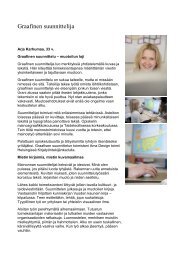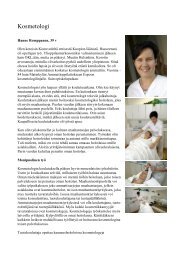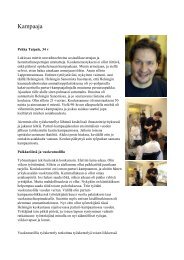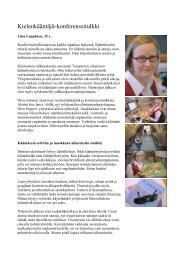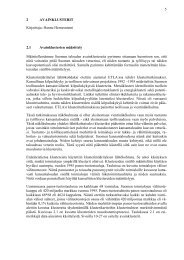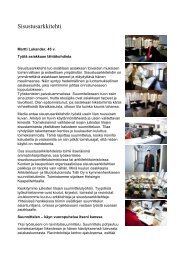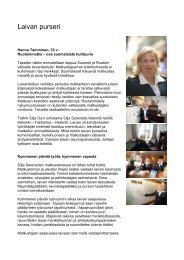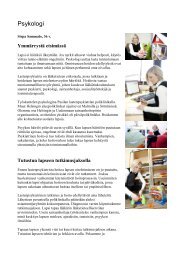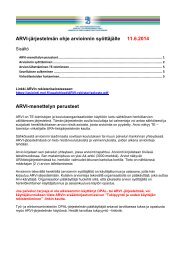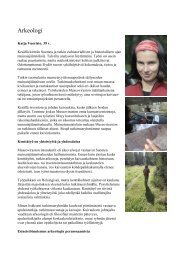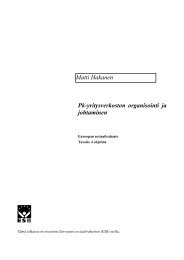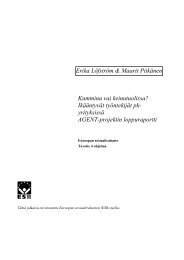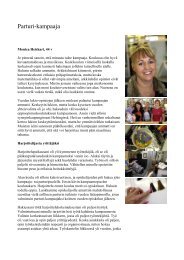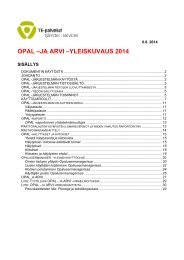Working Life Barometer in the Baltic Countries 2002 (pdf) - mol.fi
Working Life Barometer in the Baltic Countries 2002 (pdf) - mol.fi
Working Life Barometer in the Baltic Countries 2002 (pdf) - mol.fi
Create successful ePaper yourself
Turn your PDF publications into a flip-book with our unique Google optimized e-Paper software.
262<br />
still some big changes ahead for Lithuania <strong>in</strong> that sphere. Many changes have<br />
<strong>in</strong>deed taken place <strong>in</strong> <strong>the</strong> country dur<strong>in</strong>g recent years - more than <strong>in</strong> <strong>the</strong> o<strong>the</strong>rs<br />
under comparison - but <strong>the</strong> trends have been contradictory.<br />
Membership of <strong>the</strong> trade union movement is rarer <strong>in</strong> Lithuania than <strong>in</strong> Latvia<br />
and Estonia. It has fallen dur<strong>in</strong>g <strong>the</strong> last few years. This dra<strong>in</strong> <strong>in</strong> membership<br />
has happened among both men and women, and among both Lithuanian nationals<br />
and o<strong>the</strong>rs (Russians, Poles, Belorussians). In <strong>the</strong> public sector, <strong>the</strong><br />
drop <strong>in</strong> membership has been small; but <strong>in</strong> <strong>the</strong> private sector, very few (5 %)<br />
belong to <strong>the</strong> unions anymore. The degree of unionisation <strong>in</strong> <strong>the</strong> Lithuanian<br />
private sector is <strong>the</strong> lowest <strong>in</strong> <strong>the</strong> whole <strong>Baltic</strong> area, and <strong>the</strong> greatest problems<br />
<strong>in</strong> <strong>the</strong> country's work<strong>in</strong>g life are <strong>in</strong> that very sector. The loss of trade union<br />
membership is seen also <strong>in</strong> <strong>the</strong> <strong>in</strong>crease <strong>in</strong> <strong>in</strong>dividual agreements and <strong>the</strong> decrease<br />
<strong>in</strong> collective agreements. More and more work<strong>in</strong>g people have agreed<br />
on <strong>the</strong> contents of <strong>the</strong>ir employment contract personally toge<strong>the</strong>r with <strong>the</strong>ir<br />
employer.<br />
Individual agreement takes place more than <strong>the</strong> wage earners would like. In<br />
Lithuania's current labour market situation, <strong>the</strong>ir powers of negotiation are not<br />
very great. Among private-sector wage earners, feel<strong>in</strong>gs of uncerta<strong>in</strong>ty and<br />
fear are common. In <strong>the</strong> private sector particularly, <strong>the</strong> status of female workers<br />
is, <strong>in</strong> general, poor. Wage earners' con<strong>fi</strong>dence <strong>in</strong> <strong>the</strong> economy of <strong>the</strong>ir<br />
workplace is low overall; and similarly, <strong>the</strong>re are only fairly few who believe<br />
that <strong>the</strong> employment situation <strong>in</strong> general will improve <strong>in</strong> <strong>the</strong> near future. In<br />
consequence, even poor work<strong>in</strong>g conditions are tolerated for fear of los<strong>in</strong>g<br />
one's job. Some companies are <strong>in</strong> real f<strong>in</strong>ancial dif<strong>fi</strong>culties, and <strong>the</strong> unfairness<br />
or problems experienced by wage earners are due <strong>fi</strong>rst and foremost to <strong>the</strong><br />
companies' economic realities ra<strong>the</strong>r than to lack of good will. On <strong>the</strong> o<strong>the</strong>r<br />
hand, <strong>the</strong>re are also companies that mercilessly exploit <strong>the</strong> subord<strong>in</strong>ate labour<br />
market status of wage earners.<br />
Long work<strong>in</strong>g weeks have become more widespread <strong>in</strong> Lithuania. There, as <strong>in</strong><br />
Latvia, those work<strong>in</strong>g <strong>in</strong> <strong>the</strong> private and <strong>in</strong> <strong>the</strong> public sector have very different<br />
work<strong>in</strong>g weeks. It is noticeable that <strong>the</strong> leng<strong>the</strong>n<strong>in</strong>g <strong>in</strong> Lithuania's work<strong>in</strong>g<br />
weeks is due to longer weekly hours for private-sector employees. Wage earners<br />
<strong>in</strong> <strong>the</strong> public sector work practically <strong>the</strong> same weekly hours as three years<br />
earlier. In <strong>the</strong> private sector, <strong>the</strong> average number of hours worked per week by



